Key Indicators and Goals
The indicators and targets adopted by Copel for management monitoring can be seen in greater detail in the Company’s Integrated Report and in the social-environmental reports of the wholly-owned subsidiaries and are related to corporate governance, sustainability management and human, intellectual, social and relationship, natural, infrastructure, and financial capital.
Copel’s set of targets follows the guidelines of its Strategic Planning and the list of targets is unfolded from the strategic objectives, reaching the organizational structures vertically and horizontally, when pertinent, integrating the areas for joint achievement. The analysis of the targets through the indicators allows the company to establish levels of performance and desired results.
In addition, Copel seeks to establish targets aligned with voluntary commitments such as the Sustainable Development Goals (SDGs) prioritized by the Brazilian Electric Power Sector, for which action plans and goals are being defined according to Copel’s specificities.
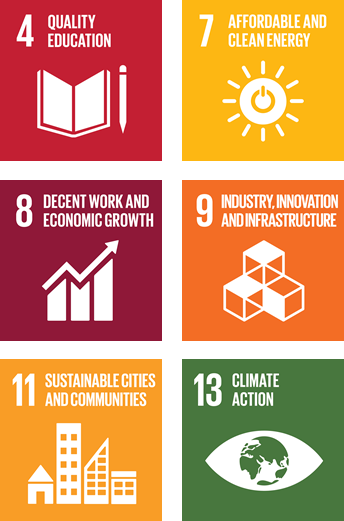
Environmental Dimension
Copel’s environmental targets are stipulated by means of commissions composed of representatives from the Company’s executive boards and are developed based on the company’s history, seeking the best use of resources, minimizing impacts and taking into account the economic analysis.
Each commission defines the values, the term and the manner of conducting these goals, which are submitted for approval by the Company’s top management, with periodic monitoring of performance and are valid for all processes and are related to the performance of employees and the management.
The main directions for the targets are the Sustainable Development Goals (SDGs) and the best market practices.
In order to monitor good practices and the quality of environmental management, Copel adopts a series of indicators, which are periodically monitored by the Company’s environmental areas, among which the following stand out:
- Atmospheric and greenhouse gas (GHG) emissions;
- Waste;
- Consumption of natural resources (eco-efficiency: water, energy, fuels, paper);
- Environmental monitoring (ichthyofauna, effluents and vegetation)

Indicator - Native vegetation cover in APPs of reservoirs
The coverage of the Permanent Preservation Areas (APPs) with native vegetation provides environmental benefits such as the conservation of biodiversity, maintenance of ecological processes and ecosystem services, contribution to the gene flow of flora and fauna by increasing connectivity between fragments and forest clumps, in addition to acting to combat the impacts of climate change.
Copel manages the APPs of all reservoirs of enterprises that belong 100% to the Company and defined as an environmental performance indicator the percentage of areas, subject to restoration, with coverage of native vegetation in relation to the total area of APPs. The analysis of the vegetation cover is performed annually based on images and periodic inspections that indicate the most appropriate corrective actions for forest restoration, in accordance with the goals of SDG 11, 13 and 15.
Copel’s target for 2023 was to achieve 82% coverage with native vegetation in permanent preservation areas in the company’s reservoirs. The company achieved a performance of 82.12% and for 2030, the target is to reach 87%.
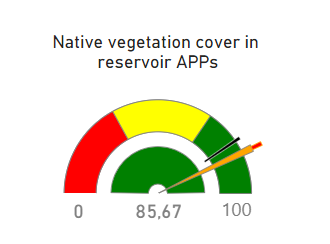

Indicator - Scope 1 Emissions
Considering that Copel has made a commitment to set targets to significantly reduce GHG emissions, targets were set for the Company’s businesses as well as its interconnection of processes, which were established adopting the SBTi (Science-Based Targets) precepts that correspond to the practices to be adopted for companies that are engaged with Net Zero commitments. The main targets are related to the decarbonization of the generation matrix, fleet, land use change and SF6.
Copel’s Carbon Neutrality Plan aims, by 2030, to neutralize Scope 1 Greenhouse Gas (GHG) emissions for the assets that Copel has operational control, through the reduction and compensation of residual emissions, in line with the targets of SDGs 7, 11, 12 and 13.
Copel’s target for 2024 has been adjusted to 75% due to the anticipated divestment in thermal power plants and the replacement of combustion-powered vehicles with electric models.
Indicator - Electric Vehicle Fleet
The actions of the Eco-efficiency Programme aim at the reduction of consumption of natural resources, the awareness of its collaborators and the reduction of costs, as a matter of education, respect for the environment and concern with future generations.
The operational fleet generates negative impacts to the environment, due to its emission of greenhouse and atmospheric gases. Thus, the Company approved the modernization of its light fleet with the replacement of combustion vehicles by electric vehicles, in accordance with the goals of SDGs 9, 11, 12 and 13. This action will help reduce direct emissions of Copel (Scope 1), collaborating to achieve carbon neutrality in 2030.
Copel’s target for 2025 is to replace 15% of the light fleet vehicles.
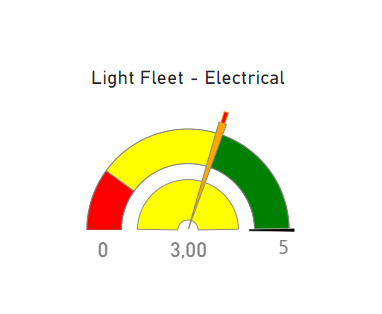
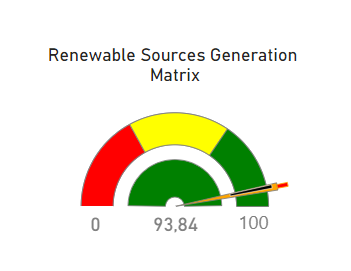
Indicator - Renewable Sources Generation Matrix
The Company stimulates research, development and innovation, seeking solutions that contemplate the adaptation to climate change and the reduction of emissions in the operation and expansion of its business.
In order to grow in a sustainable manner and aligned with discussions about the challenges related to climate change, Copel has increased investments in alternative sources of energy generation.
Copel’s energy power generation became 100% renewable during 2024, achieving the target set for 2025.
Indicator - Waste Disposal Rate
Copel follows the guidelines of the National Solid Waste Policy -PNRS (Law 12,305 of 2010) and is committed to proper waste management. With the aim of reducing the environmental impact of its activities, it follows the order of priority in waste management: avoid generating waste whenever possible; reduce the amount of waste generated; reuse and recycle as much as possible; and, finally, dispose of it properly.
One of the indicators defined to measure Copel’s environmental performance is the Sustainable Waste Disposal Rate of Operating Units. This rate represents the total waste that is diverted from final disposal and sent for recycling, co-processing, composting, or other environmentally appropriate final disposal, and is aligned with the targets for achieving SDGs 03, 06, 11, 12, and 13.
For 2024, Copel has set a target of diverting 95% of all hazardous waste (Class I) and 92% of non-hazardous waste (Class II) from final disposal. This initiative aims to maximize environmental, economic, and social benefits.
Specifically for non-hazardous waste (Class II), the goal is to achieve a 92% diversion rate from final disposal, with a focus on recycling and reuse, reinforcing Copel’s commitment to the circular economy and the preservation of natural resources.
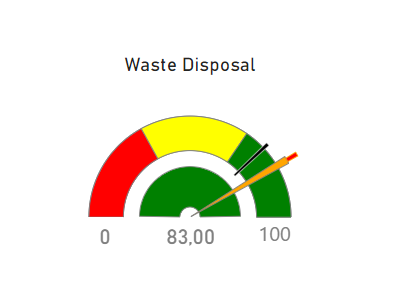
Scope 2 Emissions
To reduce scope 2 emissions, two initiatives were adopted: supplying Copel’s energy consumption through the installation of photovoltaic minigeneration systems in energy substation areas and the adoption of I-REC renewable energy certificates.
Copel’s target for 2025 is that at least 30% of energy consumption comes from compensation and energy certified with I-REC.
WELL Certification
Copel began adapting its main Administrative Centers with a focus on applying WELL Certification concepts to its facilities. This certification is based on monitoring the impacts of physical facilities on the health and well-being of their occupants, with its concepts being: Air, Water, Nutrition, Lighting, Fitness, Comfort and Mind.
Copel’s target for 2025 is to certify 30% of Administrative Centers.
Social Dimension
Copel’s performance in the social dimension is measured by a series of indicators and targets established between the areas and senior management, with the purpose of ensuring compliance with current legislation, sustainability in all its dimensions – social, economic and environmental; and to value the Company’s intangible assets.
Among the aspects related to people management, we highlight the personal and professional development, respect for diversity and encouraging equity, promoting accessibility and a commitment to health and safety at work.
Each area of the company establishes its indicators and targets annually, and currently these results are linked to an individual development plan, which can result in variable benefits granted by the company to its employees.

The actions with the community, the volunteer program, social investments and the expansion of access to energy with all the quality and security that Copel provides, give the company a prominent role in the sector, whose evaluation of consumers guarantees successive recognition and they mark the excellence of performance.
Copel is proud to be the first company in the energy sector to adhere to the United Nations Global Compact and aligns its indicators and targets with the Sustainable Development Goals (SDGs), providing clean and affordable energy, striving for decent work, ensuring economic growth, investing in innovation, expanding and improving infrastructure, reducing inequalities, helping communities and cities to be more sustainable and combating climate change.
Indicator - Evaluation of Employee Performance
Copel’s employee performance evaluation is carried out by the Nossa Energia Program, which is structured and consolidated within the Company and contributes to the development and improvement of employee performance, in line with SDG goals 4, 8, 10, and 12.
Copel’s current Performance Management model covers all company employees, with the goal of evaluating 100% of those eligible, except for those on leave, newly hired/reinstated or dismissed, according to the period established by the rules of each program evaluation cycle.
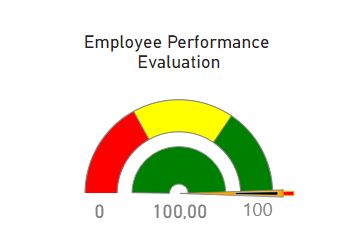
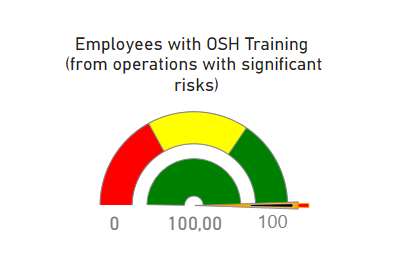
Indicator - Employees with training in Health and Safety
Occupational health and safety management starts with accident prevention, either through technical and awareness training or through corporate programs to identify and mitigate accident risks, in line with the targets of SDGs 3, 4 and 8.
Copel’s target for 2025 is to keep 100% of employees trained in mandatory courses related to health and safety at work.
Indicator - Workforce fatalities - Own
Health and Safety at work is present in Copel’s Strategic Reference, specifically defined as one of the Company’s values. Based on this premise, it seeks to ensure a healthy work environment in which employees and managers collaborate in the use of a process of continuous improvement of protection and promotion of safety, health and well-being of all, according to the targets of SDG 3 and 8.
In this sense, Copel has several programs focused on occupational health and safety, besides campaigns aimed at eliminating occupational accidents.
In 2024, a specific occupational health and safety target was set – zero fatal accidents for the workforce – linked to the variable remuneration of all the Company’s own employees. In 2024, there were no fatalities among the Company’s own workforce.
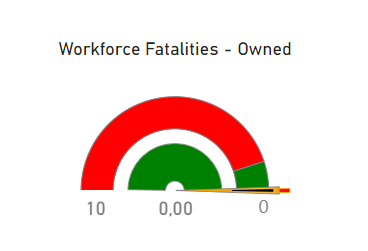
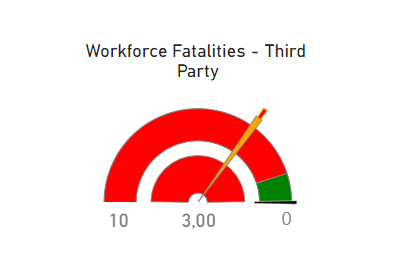
Indicator - Fatalities in the Workforce - Outsourced Employees
Before beginning their activities, outsourced employees undergo integration training, in which the risks and precautions related to health and safety for the execution of tasks are addressed.
Additionally, for risky activities, certificates of completion of mandatory training, as provided in the Regulatory Standards of the Ministry of Labour and Employment, carried out by external entities, are required.
These actions, among many others, aim to achieve the goal of Zero Fatal Accidents in the Company’s activities, as of 2023, in accordance with the goals of SDG 3 and 8.
In 2024, a specific occupational health and safety target was set: zero fatal accidents for the workforce. Therefore, the target set for 2024 was not met, as there was one fatality among the outsourced workforce.
Indicator - Customer Satisfaction Index
Customer satisfaction is directly linked to the economic-financial performance and to the reputation of organizations. It is a performance indicator that allows measuring how much the company meets the customer’s expectations regarding products and services, under several aspects, such as relationship, service, term, price, trust, operational efficiency and cost/benefit ratio.
Thus, customer satisfaction in relation to Copel Distribuição is monitored, among other ways, by applying the annual satisfaction survey, conducted by the federal government regulator, Aneel.
Copel’s target for 2025 is to reach a 81% customer satisfaction index.
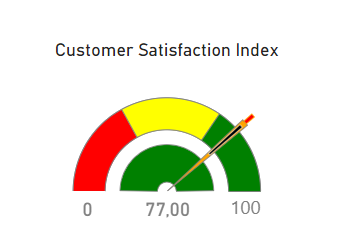
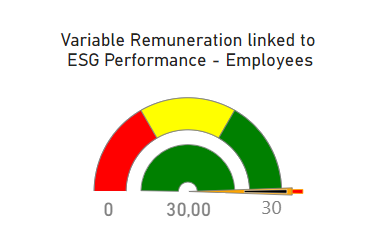
Indicator - Variable Remuneration linked to ESG Performance - employees
Variable compensation is a Copel practice, complementary to fixed compensation, which involves all employees and contributes to the cultural change at the Company with a focus on meritocracy and on valuing professionals according to their deliveries. Thus, employees are encouraged to work with challenging goals, to achieve differentiated levels of results and receive variable remuneration according to their achievements.
Copel has a merit-based variable compensation program for all employees, with financial, operational and sustainability goals.
Following corporate governance best practices, 30% of the variable remuneration of senior management members is linked directly to ESG performance.
Governance Dimension
Copel stands out in corporate governance and has the practice of constantly improving its governance system, which includes monitoring the effectiveness of Corporate Governance practices, carried out through specific indicators.
The governance performance indicators and targets are aimed at measuring Copel’s adherence to the best market practices and are based on compliance with the requirements of the Program Outstanding in State Governance and the Corporate Governance dimension of the Corporate Sustainability Index (ISE), of B3.
Among the criteria for appointment to the Company’s statutory bodies are the diversity and experience of the members of the collegiate bodies, who undergo an annual evaluation, aiming at measuring the performance of the senior management. To learn more about Copel’s indicators, access the Company’s reports.
Indicator - Performance Evaluation of the Senior Management
In order to ensure that administrators’ performance is always aligned with the best interests of the Company and interested parties, Copel uses as a reference the Code of Best Governance Practices for Public Companies, from the Brazilian Institute of Corporate Governance (IBGC), in addition of the rules and regulations of the stock exchanges where it is listed and Federal Law No. 6,404/1976.
As established in the Company’s Bylaws and the Annual Performance Evaluation Policy of Statutory Bodies, the statutory bodies of Copel (Holding) and its wholly-owned subsidiaries undergo an annual performance evaluation process.
Following the applicable legal requirements and with reference to the best corporate governance practices, 100% of the Company’s collegiate bodies, including the governance secretariat, as well as the respective members are evaluated.
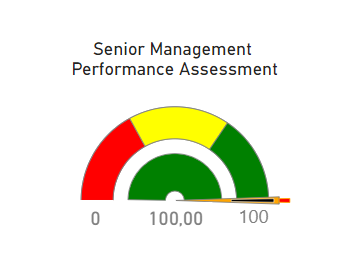
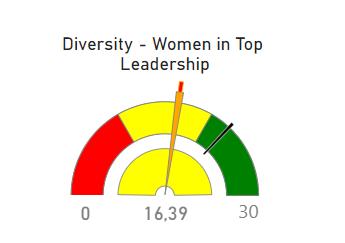
Indicator - Diversity - Women in top leadership
Diversity in Senior Leadership is an objective of the Company, and not just a goal setting, but aims to include underrepresented groups in strategic positions, ensuring higher quality and representativeness of decision making, since it allows different lines of reasoning and perspectives. The Board of Directors, the Executive Board and Strategic Level Managers (Superintendents and Assistant Directors) are considered Senior Leadership.
The establishment of diversity indicators and targets related to senior leadership positions are supported by Female Leadership Development programs promoted by the Company. For the purpose of monitoring this indicator, the number of women in senior leadership in the base year 2022 is considered.
Copel’s goal for 2025 is to increase the number of women in the Company’s senior leadership positions by 40%.
Indicator - Employees trained in Code of Conduct and Cybersecurity
The principles that guide Copel’s Integrity actions are based on the Company’s values, on the Code of Conduct and on the Global Compact of the United Nations (UN). The actions carried out by the responsible areas are compiled in the Integrity Program, whose purpose is the correct treatment of ethical and conduct deviations and mainly the implementation of anti-corruption measures.
Copel’s Integrity Program is aligned with the Anti-Corruption Law (nº 12,846/2013). With a scope that involves all employees, administrators and tax advisors, the Integrity Program is structured to prevent, detect and remedy potential harmful acts such as conflicts of interest, fraud in bidding and payment processes, among other points.
Copel’s goal for 2025 is to train 100% of employees in Anticorruption, Code of Conduct and Cybersecurity courses.
Code of conduct
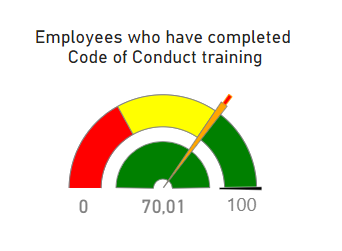
Cybersecurity
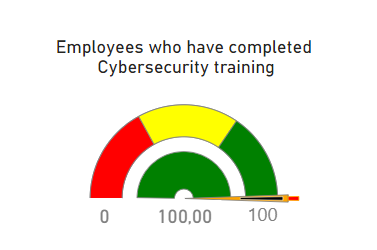
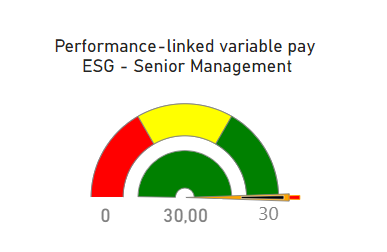
Indicator - Variable Remuneration linked to Performance ESG - Top Management
The remuneration policy for the Company’s administrators is in line with the best market practices, considering the applicable legislation and aiming at remunerating the responsibilities, the time dedicated to the function, the necessary qualification and skills, as well as the risks inherent to each position.
In addition, as established in the remuneration policy, indicators linked to the budget and strategic planning are considered, as well as indicators of achievement of ESG (Environmental, Social and Governance) goals, reinforcing the commitment with the creation of value in a sustainable manner for the shareholders and other stakeholders.
Following best corporate governance practices, 30% of senior management’s variable compensation is directly linked to ESG performance.

Sustainability Management
Copel’s sustainability management is guided by global parameters and seeks to ensure that the Company’s business remains profitable and competitive, meeting the expectations of shareholders and investors, as well as environmental, social and ethical factors, in the medium and long term, in order to meet the other stakeholders, contributing to sustainable development.
ISE B3 Indicator
The Corporate Sustainability Index (ISE), from Brasil, Bolsa, Balcão (B3 S.A.), is a tool for comparative analysis of the performance of companies listed on B3 under the aspect of corporate sustainability, based on economic efficiency, environmental balance, social justice and corporate governance.
The ISE B3 was created in 2005, being a pioneer in Latin America and the fourth sustainability index in the world, of which Copel is proud to have participated in 18 of the 19 editions since its launch.
Besides being a strong reference in responsible investment options in Brazil, the ISE B3 stands out for its historical performance above the indexes presented by B3 and as an inducer of good corporate practices.
Copel’s goal for 2023 is a performance of 82 points on the ISE B3.
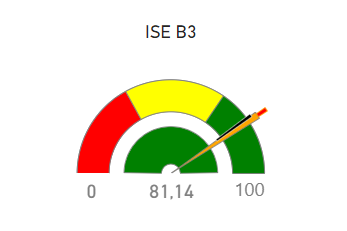
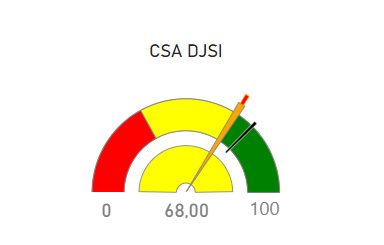
CSA/DJSI Indicator
S&P Global’s Corporate Sustainability Assessment (CSA) questionnaire is an annual assessment of sustainability practices, covering more than 10,000 organizations worldwide and intended for companies seeking to establish a sustainability baseline and gain an independent view of their performance relative to similar companies.
The CSA allows you to report on key sustainability metrics and monitor company performance across a wide range of industry-specific environmental, social, economic and governance criteria. The results are not only an important resource for the community and the financial market, but also provide guidance to employees, customers and other stakeholders on the effectiveness of actions towards sustainable development.
One of the objectives of the current administration is to improve Copel’s sustainability actions, which means placing the Company among the reference companies in sustainable development, attracting investments and reinforcing the positive impact of its image. For this reason, the improvement of sustainability performance is measured through the CSA/DJSI and is linked to the goals of the Performance Award (PPD) of the entire company.
Copel’s goal for 2023 is a performance of 75 points in the CSA/DJSI.





Indicators - Sustainable Facilities